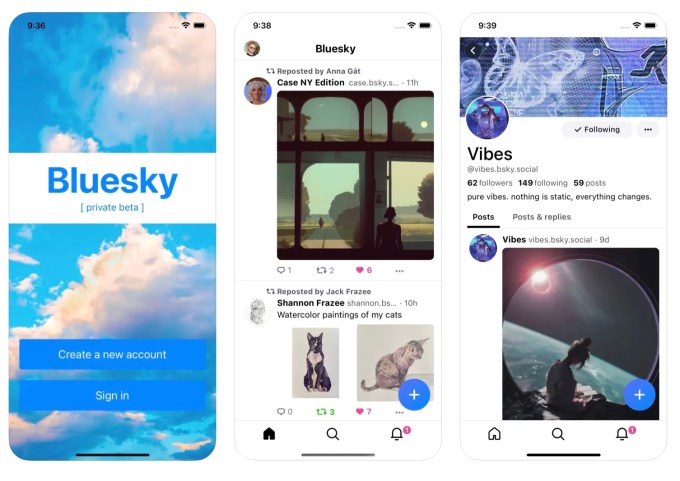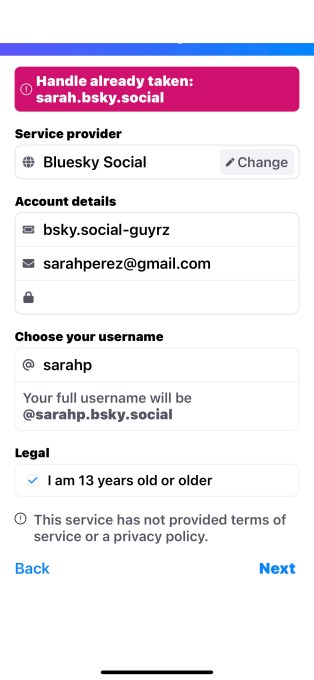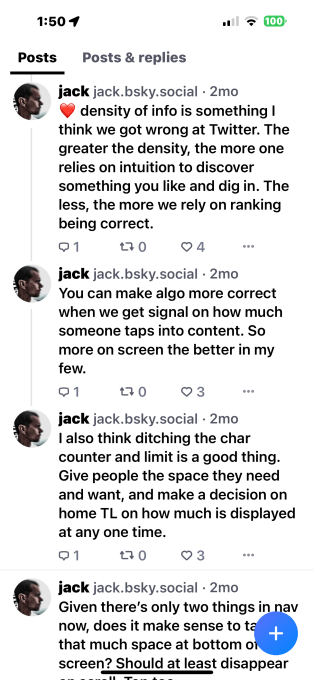Bluesky, the Twitter alternative backed by Twitter co-founder and CEO Jack Dorsey, has hit the App Store and more testers are gaining access. Though the app is still only available as an invite-only beta, its App Store arrival signals that a public launch could be nearing.
We haven’t heard much from Bluesky since October 2022, when the team behind the project shared an update on the Bluesky blog, detailing the status of the social protocol that powers its new Twitter-like app, also called Bluesky.
AT (originally called ADX, or “Authenticated Transfer Protocol,”) is Bluesky’s main effort while the Bluesky mobile app serves to showcase the protocol in action. Similar to the ActivityPub protocol that powers Mastodon, AT offers the means of creating a federated and decentralized social network. However, there’s been some criticism of the project, notably from Mastdon and other developers, who pointed out that ActivityPub — a recommended W3C standard — already powers a large and growing “Fediverse” of interconnected servers.
And that Fediverse has been gaining traction following Musk’s Twitter acquisition as users left the microblogging network to try the open source, decentralized alternative, Mastodon. The latter has also benefitted from the work of former Twitter third-party app developers who have since rolled out polished Mastodon clients like Ivory and Mammoth, most recently.
Other companies have also committed to or at least discussed embracing the ActivityPub standard, including Flipboard, which announced its plans today, as well as Medium, Tumblr, and possibly Flickr. Where that leaves Bluesky’s future is unclear.

Image Credits: Bluesky on App Store
The Bluesky project, now a public benefit company, had originally been incubated within Twitter starting in 2019 when Jack Dorsey served as CEO. Twitter also provided its financial backing for years. Though its founding was well ahead of the company’s sale to current owner Elon Musk, the two execs more recently had discussed the idea of an open source protocol over text messages ahead of Musk’s Twitter acquisition.
In texts, Dorsey explained to Musk that a “new platform is needed. It can’t be a company. This is why I left [Twitter].” (Dorsey exited the CEO role at the social network in November 2021 but remained on Twitter’s board through May 2022.)
Shortly after giving up his CEO duties, Dorsey took to Twitter to publicly talk about Bluesky, describing it as “an open decentralized standard for social media.” That discussion had taken place around the time when Dorsey was sharing his thoughts about Twitter’s decision to ban President Trump from its platform. Bluesky, he believed, would reduce the ability for large, centralized platforms — like Twitter — to have so much power in terms of deciding which users and communities could engage in speech and who would be responsible for moderating that content.
Bluesky said last year it had received $13 million to ensure it had the freedom and independence to get started on R&D and Jack Dorsey was on its board. It noted Twitter’s funding of Bluesky was also “not subject to any conditions except one: that Bluesky was to research and develop technologies that enable open and decentralized public conversation.” To what extent Twitter would continue to fund Bluesky’s efforts, when it’s not even paying its own bills, is unknown.)
Hands-on with Bluesky
Now the Bluesky app is out publicly and some users are being invited to try it. According to app intelligence firm data.ai, the Bluesky iOS app debuted on February 17, 2023 and has somewhere north of 2,000 installs. Given its invite-only status, this likely represents only the newly added beta testers at this time. The app isn’t yet ranking on any Top Charts in the U.S., and it’s not available on Google Play.
We received an invite to the service and found it to be a functional, if still rather bare-bones, Twitter-like experience.
Users create a handle which is then represented as @username.bsky.social as well as the display name that appears more prominently in bold text, as on Twitter.

Image Credits: Bluesky screenshot, who took my handle?
As a brand-new app, Bluesky’s suggested user list didn’t immediately impress with big names of public figures during onboarding. Mastodon, meanwhile, has managed to attract more high-profile individuals in the wake of the Musk-prompted Twitter exodus, by comparison.
The app itself presents a simplified user interface where you can click a plus button to create a post of 256 characters, which can include photos. (Though, unlike Mastodon, it doesn’t prompt you for alt text for accessibility’s sake).
Where Twitter asks “What’s happening?,” Bluesky asks “What’s up?”
You can search for and follow other individuals, much like on Twitter, then view their updates in a Home timeline. User profiles contain the same sort of features you’d expect: a profile pic, background, bio, and metrics like the number of followers and posts a user has, as well as how many people they’re following. Profile feeds are also divided into two sections, like Twitter: posts and posts & replies.

Image Credits: Bluesky screenshot
Bluesky users can share, mute and block accounts, but advanced tools, like adding them to lists, are not yet available.
The discover tab in the bottom center of the app’s navigation is useful, offering more “who to follow” suggestions and a running feed of recently posted Bluesky updates. The latter gives you the opportunity to find more people who you might like to follow, based on their posts rather than just a bio.
Posts themselves can be replied to, retweeted, liked, and, from a three-dot menu, reported, shared via the iOS Share Sheet to other apps, or copied as text.
Another tab lets you check on your Notifications, including likes, reposts, follows and replies, also much like Twitter. There are no DMs.

Image Credits: Bluesky screenshot
The app was experiencing a bug when we tested, showing errors when you try to click into various sections at times, but a Bluesky developer replied to our post that a fix was coming in an hour. (As Bluesky is not open to the public, this is easily forgivable.)
There’s something ironic about leaving Twitter to use an app that looks and feels so much like Twitter, right down to posts from Jack Dorsey as he muses over product concerns like “density of info,” character count, or in-app navigation. Bluesky’s larger promise is the new underpinning technology of the AT protocol, but the app itself feels like a stripped-down Twitter.
In a way, it’s nice to be away from Twitter’s mean tweets, crypto scams, and clout-chasing posts (including from its new owner). But there are already so many Twitter clones now in the works, including the yet-to-launch-publicly projects like T2, Spill and Post; it’s hard to imagine carving out time to use another app, as well. (Of course, if Twitter adopted AT, things could get more interesting. But who knows what Musk is up to these days.)

Image Credits: Bluesky screenshot of @Jack
Arguably, some are not sold on the promise that the web needed another decentralized protocol that serves the same purpose as ActivityPub, either. After all, a million little Fediverses is not the decentralized web of our dreams.
Bluesky declined to comment or answer questions about the app and beta, noting it’s not doing press at this time as it’s focused on working through bugs.
Jack Dorsey-backed Twitter alternative Bluesky hits the App Store as an invite-only app by Sarah Perez originally published on TechCrunch
from TechCrunch https://ift.tt/knwcLzj

Comments
Post a Comment